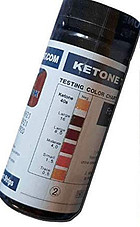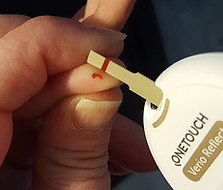Controlling blood glucose (sugar) levels is key in any Diabetes Management Plan and that is why it is important to fully understand What’s Hyperglycemia and know how to treat it.
Wikipedia explains hyperglycemia as a condition in which an excessive amount of glucose (sugar) circulates the plasma.

Hyperglycemia can be very serious and is a concern to both Type 1 and Type 2 Diabetics.
There are 2 main types of Hyperglycemia ( high blood sugar):
- Fasting Hyperglycemia
- this is when the blood glucose levels are high after not eating or drinking for 8 hours or more
- After meal (postprandial) Hyperglycemia
- this occurs when blood glucose levels remain high 2 hours after eating. This does not usually occur to people who are not Diabetic unless it was an unusually large meal (while not common, it is possible)
Frequent or ongoing high blood glucose levels can cause damage to nerves, blood vessels, and organs.
That is why it is so important to know the signs and symptoms of Hyperglycemia.
Table of Contents
Signs and Symptoms
A Diabetic person may have some of these early symptoms of Hyperglycemia:
- excessive thirst
- frequent urination
- headaches
- trouble concentrating
- blurred vision
- weak, tired feeling
- unplanned weight loss
- tests high with a blood glucose monitor
If left untreated the person may also experience:
- vaginal and skin infections
- worse vision
- cuts and sores may be slow to heal
- nerve damage causing painful or cold feet, hair loss on the lower extremities, or erectile dysfunction
- chronic constipation or diarrhea
- damage to eyes or kidneys
Causes of Hyperglycemia
There are several potential reasons why you may have high blood glucose levels which may include:
- skipping or forgetting to take your insulin or oral medication
- eating too many carbohydrates or eating too many carbs for the amount of insulin you have taken
- illness
- have an infection
- less active than usual
- more exercise than usual, especially if blood glucose is already high and insulin levels are low
Why Is Hyperglycemia Dangerous
If left untreated for too long Hyperglycemia can be extremely dangerous. Your health care team will tell you what your target range should be and what to do if your levels are not within that range.
The complications that arise from blood glucose levels being too high occur over time. That is why following your Diabetes Treatment Plan is so important.
If your blood glucose levels are left high for too long your blood can develop what is called Diabetic Ketoacidosis.

What this means is that your blood develops ketones (toxic acids) which significantly increases the risk of developing serious complications.
The most common signs of Ketoacidosis (check out my article on Diabetic Ketoacidosis here) are:
- high levels of keytones in the urine (as tested with test strips)
- shortness of breath
- dry mouth
- fruity-smelling breath
May also experience stomach pain, nausea or vomiting, and confusion. Any Diabetic experiencing these symptoms requires immediate medical treatment.
Prevention of Hyperglycemia
It is possible to prevent Severe Hyperglycemia or Ketoacidosis from occurring by following your Diabetes Management Plan as set out by your Health Care Team.

This means frequently monitoring blood glucose levels and treating highs as recommended by your doctor.
Usually, that would include:
- take insulin as prescribed
- avoid consuming too much sugary food or drink
- manage stress levels
- maintain regular exercise
- attend all doctor appointments
Conclusion
Hyperglycemia is a serious complication of Diabetes. By frequently monitoring blood glucose levels and treating high blood sugars immediately Severe Hyperglycemia can be avoided.
By diligently keeping blood glucose levels within their target range the risk of many of the complications of Hyperglycemia can be significantly reduced.
My advice is to follow your doctor’s recommendations and follow your treatment plan, it was designed specifically for you.
Thanks for dropping by, you can leave comments or questions below.


This is very good info. I was once concerned I had diabetes, as I had so many of the symptoms you mentioned above. Thankfully I tested negative, but it is so good to be aware of what to look out for. I’m sure so many people have it and don’t know it. It’s so important to stay on top of our health and look into things that seem ‘off’. Thanks for this informative post!
Thanks for the comment Carla. I’m glad you were able to recognize that things “seemed off” and took it seriously enough to get checked out. My daughter recognized the symptoms in her son and it turned out her instincts were correct. Our grandson has adjusted beautifully to his new normal and while we won’t be at the one year mark till June it is hard to remember life before Type 1 Diabetes entered our lives. It is so important to be in tune with our bodies so we can recognize when something is different and get it checked out before it is life threatening. Thanks again and best wishes.
Learned something today by checking out this very informative article. Thanks so much for sharing this information
Thanks for the comment Elizabeth.I’m glad you were able to learn something. I find it is important to be learning daily. Thanks again and best wishes.
This article is very informative. Great info to know!
Thanks for the comment Andrea. The more we are informed the more we are able to assist others if the need should arise.
Thanks again.